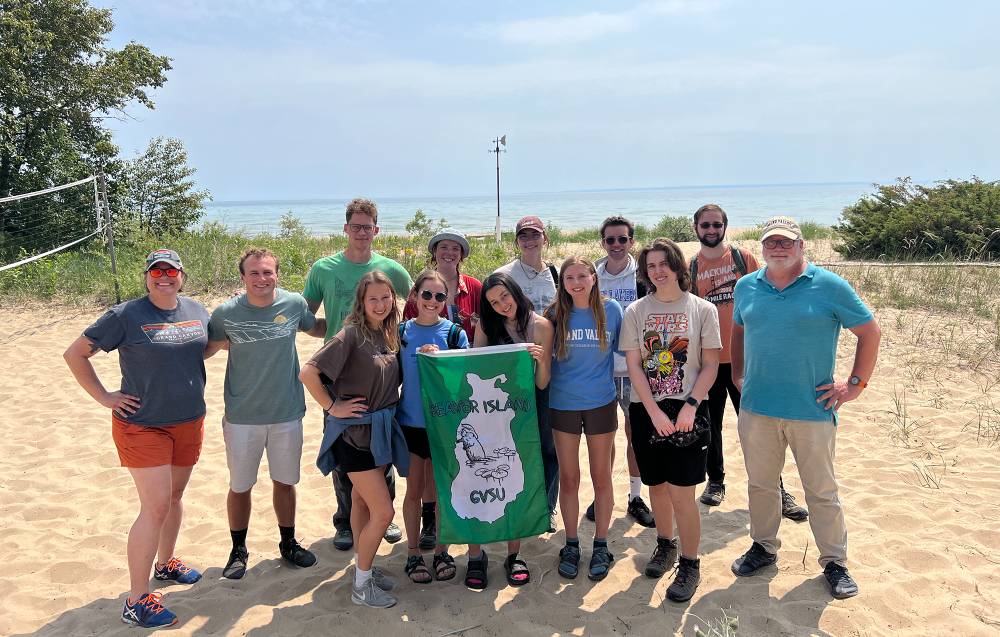In 2022, Dr. Kelly Parker, professor of philosophy and director of environmental studies at Grand Valley State University, organized and led the first Beaver Island Field School trip, which is part of a hybrid spring/summer class.
This will be on the course catalog this upcoming semester for the third consecutive year. The hybrid course includes a one-day orientation at GVSU’s Allendale Campus, followed by a week of online learning and concludes with a week’s stay on Beaver Island. The class allows students to research the island’s environment and sustainability, and put together a report and proposal based on their findings.
Parker is preparing to make the trip with a total of 12 student spots open for the tight-knit cohort. While the spring/summer course is through the Environmental and Sustainability Studies (ENS) Department, students of all majors are encouraged to apply.
Parker, who has been at GVSU for 32 years, helped to develop the ENS major, which became available during the 2019-2020 academic year. He put together the Field School program through personal contacts. In addition to the Beaver Island Field School, the ENS Department has one other field program called Semester in Detroit.
The Beaver Island Field School course partners with the island’s Central Michigan University’s (CMU) Beaver Island Biological Research Station. CMU allows GVSU students to stay in the campground’s cabins near the research facility and use their cafeteria.
While students are only on the island for one week, they are challenged to work with one another and community members to apply skills learned in the classroom to real-world sustainability issues. This year, the class will be focusing on working with the local community on sustainable food systems, and obtaining what Parker refers to as “food sovereignty from the island.”
“We’re coming in as guests, we’re coming in as outsiders and so we are learning how to connect with the local residents, business owners, other people that we work with, and make a good impression,” Parker said. “We (have to) really listen to find out what it is that they’re facing and what kinds of things they’re concerned about that we might be able to help with.”
Parker said the Beaver Island Field School demonstrates that “place matters.” He said the coursework on Beaver Island looks at many factors specific to this location.
“It’s an island, and sustainability means everything you need to live has either got to come from the island or be brought over on a boat or an airplane– that’s food, energy, water, housing, all of the things we talk about in sustainability studies,” Parker said. “It is probably different from what field school experiences they might’ve had in other disciplines. If you go (into) geology or biology or whatever, it’s going to be very discipline-specific.”
At the end of the students’ week on the island, they present their research findings and proposals to the local community at the Beaver Island Sustainability Fair.
Rebecca Williams, Ph.D., an assistant professor of the GVSU Brooks College of Interdisciplinary Studies, works closely with the ENS Department as one of her areas of instruction.
Though this will be Williams’ first year as an official faculty leader of the Beaver Island Field School, she has traveled to the island independently and voluntarily worked alongside Parker and the students. That involvement, in tandem with her past fieldwork experiences and studying abroad, has only increased her enthusiasm for learning about Michigan’s history and ecology. This has driven her participation in the field school course.
“I have the experience of living and working in different situations, which is also one of the reasons I really encourage students to do this, especially if they’ve never done anything like this before,” Williams said. “It’s not a super challenging change. It’s just going a little North, going to an island and hanging out with people. It’s still Michigan, but it still gives you that ‘feels like a study-away program.’”
Williams said studying away is a fundamental experience for college students. She said Beaver Island is a unique experience.
“Beaver Island is a magical place. You can tell that it’s a special place, so I think that students also get this intangible experience that kind of stays with them for a long time,” Williams said. “It’s a unique experience for students to learn about Michigan, and learn about this very unique ecosystem, but also meet people and have this really special experience.”
As educators, the Beaver Island Field School has provided new teaching opportunities for Parker and Williams.
“I am learning more about how to engage students, more about Michigan history and ecology. The island is such a concentrated and distinctive place,” Parker said. “It’s really let me reconsider how I teach my other classes that are more traditional classroom classes. It’s been a great experience for me as an instructor because I’ve learned how to integrate different interdisciplinary perspectives to get a more holistic view of environment and sustainability.”






















